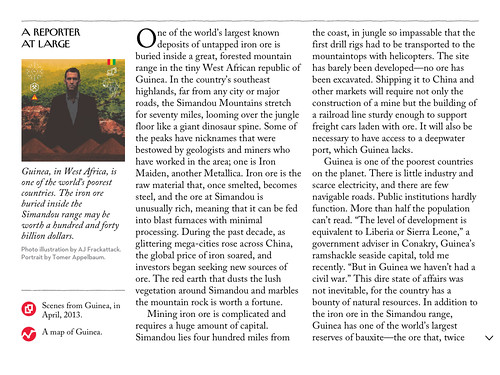I was going to write about poetry this morning, but then I came across an issue of The New Yorker open to an article that I want to use with my students this year, and I decided to write about that instead.
 |
| Screenshot of the first page from the magazine app. |
You can find the entire article here.
Two years ago, our middle school switched to humanities. Previously, we had individual courses in reading, language arts, and social studies, though we had successfully blocked language arts and reading together in terms of teachers and schedules. When our social studies teacher resigned, we decided to add social studies to our blocks (religion classes were reassigned) and call it humanities. And at first, of course, it only resembled humanities in that we called it humanities. Even now, when I call my class humanities, I mean my own definition of humanities which might not match someone else's.
During the first year, there wasn't much connection between the courses. We applied our reading and writing skills to social studies, and I used Kelly Gallagher's Article of the Week for current events (I picked my own articles). And we used the textbook, which I soon grew to hate.
I knew, though, that I wanted to do something different. While I loved studying American Lit the same year I took US History in high school, I knew that I didn't want to simply teach the novels to match the time periods. I also really wanted my students to know a lot more about the world today. I believed that learning more about now, be it a factory collapse in Bangladesh or the conflict in Syria, would make studying the history of the world more relevant later in high school and college. I believed that learning where countries were would do the same. I wanted to develop the course around a theme rather than a time period.
So that's what we did. Our 7th grade already read several strong titles related to civil rights (Mississippi Trial, 1955 by Chris Crowe and To Kill a Mockingbird by Harper Lee), so the theme is Justice. For 8th grade we chose Revolution, which works with both our historical study and any novels that we might use.
This is all still very much a work in progress; it takes years to really develop a curriculum, especially when building it from scratch. And some things, especially novel choices, will change with some frequency. Last year we read (or I read to them) A Tale of Two Cities by Charles Dickens, A Wrinkle in Time by Madeleine L'Engle, The One and Only Ivan by Katherine Applegate, and Endangered by Eliot Schrefer. This year I am only certain about TOTC and Endangered. I will probably add Bamboo People by Mitali Perkins, and I'm thinking of starting the year with Catherine Gilbert Murdock's Dairy Queen, which I didn't have time for last year.
Last year, while reading and discussing Endangered, a student asked why what happened in Congo didn't happen here after the American revolution. In the novel, Sophie explains that Congo had actually become less developed in the 50 years since gaining its independence from Belguim. What made the United States different?
That, right there, is a question to build a course around.
I know from experience that an article from The New Yorker is far too difficult for 8th graders; I have friends with graduate degrees who are intimidated by the magazine. (The Economist is the one that scares me.) The above article is 13 pages long. The first six paragraphs, however, are a terrific introduction to many of the ideas we'll discuss this year. It will take time to unpack it. Students will need to slow down, a lot, and as with A Tale of Two Cities, simple comprehension will be an accomplishment.
But these ideas, these questions. . . How can a country so rich in natural resources have such a low standard of living for its people? Why did Congo fall into war and poverty while the US became the most prosperous nation in history? What is our responsibility to others when we buy a $5 t-shirt made in a factory in Bangladesh?
These questions matter. This is why we read non-fiction and fiction. It's why we push through difficult texts. It's not about a test, or about being college or career ready, whatever that means. It's about living in the world. That's the most important lesson.
Currently reading: Undecided, and that's the truth this time. Probably Grasshopper Jungle by Andrew Smith so I can finish it before I leave town.
I wish I were reading: There's a new Billy Collins in October! Why didn't anyone tell me? Yes!




No comments:
Post a Comment